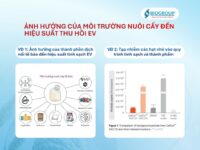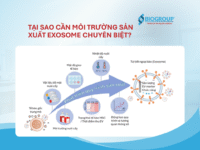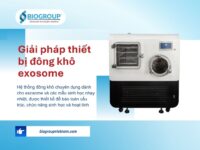EXODUS H-600 & T-2800 | Solution for exosome isolation
Exosomes have miraculous functions in tissue regeneration, immune regulation, and treating degenerative diseases. They open up excellent disease research and treatment opportunities, but efficient exosome isolation remains challenging for many research labs. Although traditional methods are widely used, they face issues with efficiency and recovery quality, creating an urgent need for new solution for exosome isolation.
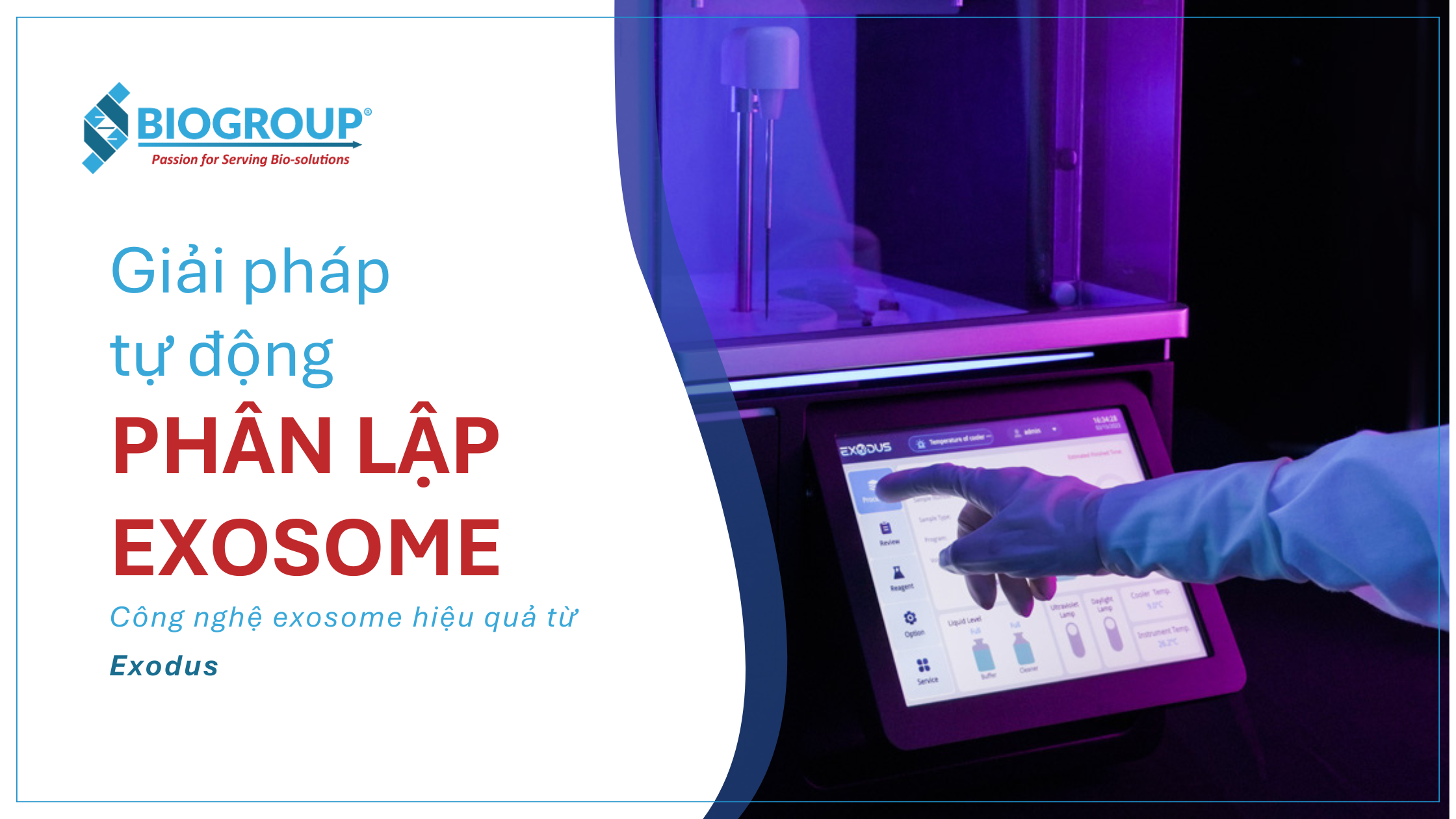
Contents
ToggleWhat are exosomes?
Exosomes are tiny membrane vesicles (approximately 30 -150 nm) secreted by most cell types. They contain proteins, lipids, and nucleic acids from the originating cells and act as biological “messengers” by transmitting signalling molecules between cells. Exosomes regulate numerous physiological and pathological processes through this mechanism, support tissue regeneration, modulate immune responses, and facilitate intracellular communication.
Notably, exosomes derived from stem cells (e.g., mesenchymal stem cells or MSCs) have been shown to possess outstanding bioactivities such as promoting recovery, tissue regeneration, anti-inflammation, and immune modulation. Due to these properties, stem cell-derived exosomes are emerging as a promising therapeutic approach in regenerative medicine and cell therapy.
Challenges in solution for exosome isolation
Despite their potential, isolating and purifying exosomes from biological samples remains a significant challenge. Exosomes exist in very low concentrations in bodily fluids, making a recovery inefficient. Furthermore, due to their similar size and density to other extracellular particles, exosomes are often contaminated with proteins, extracellular DNA, or nanoparticles during extraction. This results in low-purity preparations that can compromise research reliability and clinical applications.
- Ultracentrifugation: The most commonly used method has drawbacks – it requires expensive machinery and long processing times. Excessive centrifugal force can denature or rupture exosomes, reducing their bioactivity. Recovery yields are low, and samples are often contaminated with proteins.
- Tangential flow filtration (TFF): Uses nano-filtration membranes to concentrate exosomes from large sample volumes. TFF is faster and scales better than ultracentrifugation, but still struggles with membrane clogging and does not guarantee absolute purity. Suboptimal filtration conditions can lead to exosome loss.
- Immunoaffinity capture: Utilises antibody-coated magnetic beads to isolate exosomes with specific surface markers. This method improves purity but only captures a particular subset of exosomes. High antibody costs and limited sample capacity (small volumes) make it impractical for large-scale use.
Other techniques – such as polymer precipitation (e.g., PEG), ultrafiltration, or microfluidic electrophoresis – are also in use but generally fail to deliver a combination of speed, cost-effectiveness, high purity, and yield. The lack of an optimal isolation method has slowed exosome research and large-scale therapeutic exosome production development.
EXODUS H-600 – Automated exosome isolation system for R&D
EXODUS H-600 is an automated, label-free, high-efficiency exosome isolation system designed for laboratory research. The device rapidly separates intact exosomes with superior purity and yield: approximately 99% purity and ~90% recovery from the original sample. With a fully integrated automated workflow, users only need to load samples and buffers – the system performs all separation and purification steps autonomously. H-600 can process up to 200 mL of sample per hour – significantly faster than traditional ultracentrifugation.
This system does not require expensive antibodies or precipitation chemicals – standard PBS buffer is sufficient for exosome elution. This reduces consumable costs and avoids chemical contamination. EXODUS H-600 can process various biological samples (plasma, body fluids, culture media, tissue samples, etc.) with volumes ranging from 10 μL to 250 mL. It is the ideal solution for R&D labs and biobanks, enabling fast, consistent, high-quality exosome extraction with minimal manual effort.
EXODUS T-2800 – GMP-grade large-scale exosome isolation solution
While the EXODUS H-600 is built for small-scale research, the EXODUS T-2800 is designed for large-scale GMP-compliant exosome production in industrial settings. The EXODUS T-2800 is a high-performance, automated isolation system for mass production, integrating input processing, exosome separation, and product collection in a single platform. Using advanced ultrasound-assisted nanofiltration technology, the system isolates exosomes without labelling chemicals, delivering high purity and efficiency at an industrial scale. It can process tens of litres per batch, yielding concentrated exosome solutions with densities exceeding 1011 particles/mL – ideal for therapeutic, drug delivery, or regenerative medicine applications requiring large volumes.
Beyond performance, the EXODUS T-2800 meets stringent biosafety and quality standards. It uses sterile, single-use disposable kits to prevent contamination. The hardware and software comply with Good Manufacturing Practice (GMP) standards and 21 CFR Part 11. It’s a fully automated process that ensures consistent batch-to-batch quality. It is an optimal solution for cell therapy centres and biopharmaceutical manufacturers aiming to produce exosomes at scale while maintaining regulatory compliance.
Therapeutic applications of exosomes
With their unique regenerative and cell-modulating properties, exosomes are being explored across a wide range of medical applications:
- Musculoskeletal disorders: MSC-derived exosomes show potential in treating degenerative diseases like osteoarthritis by regenerating cartilage, reducing inflammation and pain, and improving mobility. Clinical trials using MSC exosomes (e.g., ExoFlo) have demonstrated significant pain relief and improved joint function after six months of knee injections.
- Neurology: Exosomes are opening new avenues for treating complex conditions like stroke and Alzheimer’s. Preclinical studies indicate that exosomes can protect neurons, reduce inflammation, and promote brain tissue recovery after injury. Notably, the U.S. FDA has approved early-phase clinical trials for AB126, an exosome-based ischemic stroke therapy set to begin in 2024.
- Immunology: Exosomes are under investigation for autoimmune and chronic inflammatory diseases like rheumatoid arthritis and lupus. Their strong immunomodulatory effects – such as RNA and proteins that suppress pro-inflammatory cytokines – help reduce tissue damage in these conditions.
- Other fields: Exosomes are also being tested as drug delivery vehicles for cancer treatment, as support for pancreatic regeneration in diabetes, and even dermatological aesthetics (skin rejuvenation, hair growth). While most applications are still in preclinical or early clinical stages, early results are promising. Exosomes may soon become the foundation for breakthrough therapies targeting degenerative, injury-related, and immune disorders.
Key advantages of the EXODUS systems
Both EXODUS H-600 and EXODUS T-2800 offer groundbreaking solutions to long-standing exosome isolation challenges. Key advantages include:
- Fully automated operation: EXODUS systems operate via closed, automated workflows from sample processing to exosome collection. This reduces manual labour, minimises human error, and ensures batch consistency. Users input parameters and let the machine handle the rest.
- High yield and superior purity: Leveraging dual nano-membrane filtration and proprietary oscillation technology, EXODUS yields large quantities of highly pure exosomes. The system can eliminate >99% of protein contaminants, achieving exosome-to-protein ratios as high as 5×108 particles/mg. The resulting exosome concentrate (1011–1012 particles/mL) is free of DNA and endotoxins, meeting stringent application standards.
- Time, Labour, and Cost efficiency: EXODUS significantly reduces isolation time compared to traditional methods. EXODUS H-600 can process 200 mL/hour, while EXODUS T-2800 handles 1–2 litres/hour, accelerating R&D and manufacturing. Its automation allows one technician to operate the system efficiently, reducing labour demands and operating costs per exosome unit.
- GMP-Ready and safe for manufacturing: Especially with the EXODUS T-2800, EXODUS systems are optimised for GMP-grade environments. The entire process occurs in a closed, sterile system using single-use filter kits to prevent cross-contamination. Comprehensive quality controls and 21 CFR Part 11-compliant software ensure regulatory compliance and reliability for therapeutic-grade exosome production.
With these advantages, EXODUS enhances research efficiency and paves the way for scalable exosome production, accelerating the journey from lab discovery to clinical application.
Biogroup Vietnam – Strategic partner providing EXODUS in Vietnam
As a leading distributor of advanced biomedical equipment, Biogroup Vietnam is proud to be EXODUS’s official and strategic partner in the Vietnamese market. With a mission to bring global cutting-edge technologies closer to local research institutes, laboratories, hospitals, and biopharmaceutical manufacturers, Biogroup ensures that Vietnamese scientists have direct access to the most efficient and innovative solutions for exosome isolation and regenerative medicine.
Biogroup not only distributes the EXODUS H-600 & T-2800 systems but also offers technical consultation, installation, training, and long-term maintenance to help research and clinical facilities maximize the performance and value of their investment. Our highly trained experts are always ready to provide support throughout the product lifecycle – from initial assessment and demo to post-sale service.
By introducing EXODUS H-600 and EXODUS T-2800 to Vietnam, Biogroup accelerates translational research and clinical-grade exosome production, empowering the local biomedical community to pursue new frontiers in cell therapy, regenerative medicine, and precision drug delivery.
With the rise of exosome-based therapies and regenerative medicine, the demand for high-quality, scalable, and reliable exosome isolation solutions has never been greater. The EXODUS H-600 and EXODUS T-2800 systems represent a technological breakthrough, offering fully automated, label-free exosome isolation with unmatched purity, yield, and operational efficiency.
Whether you’re a research lab seeking consistent and rapid exosome extraction or a biomanufacturing facility aiming for GMP-compliant large-scale exosome production, the EXODUS platform is designed to meet your needs. Combined with the expert support of Biogroup Vietnam, EXODUS is paving the way to bring the future of exosome therapy into reality – safely, effectively, and efficiently.
Contact us for EXODUS H-600 & T-2800 consultation
- Website: https://biogroupvietnam.com/public/lien-he
- Hotline: +84 963 621 421
- Email: info@biogroupvietnam.vn
References
- BioGroup Vietnam. (n.d.). BioGroup Vietnam Co., Ltd. https://biogroupvietnam.com
- Exodus Bio. (2025, May 12). Home – Exodus Bio. https://exodusbio.com
- Premium Therapy. (2025, May 16). Premium Therapy – Healthcare consulting and solution providing. https://premiumtherapy.vn
- NeurologyLive. (n.d.). NeurologyLive – Clinical neurology news and expert insights. https://neurologylive.com
- International Society for Extracellular Vesicles (ISEV). (n.d.). ISEV Official Website. https://www.isev.org
- Exodus Bio. (n.d.). EXODUS Product Brochure.
Categories
- Blog (66)
- News (45)
- Recruitment (11)
- New Products & Technologies (50)
- Training & Webinar (25)
- Virtual Booth (1)

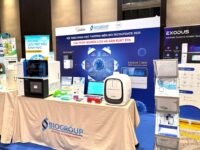
![[Infographic] Môi trường nuôi cấy thế hệ thứ 3: CD AOF (Chemically Defined & Animal Origin Free)](https://biogroupvietnam.com/wp-content/uploads/2026/02/infographic-moi-truong-nuoi-cay-the-he-thu-3-cd-aof-200x150.png)
